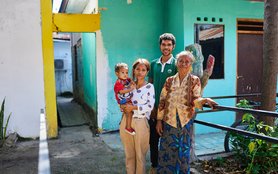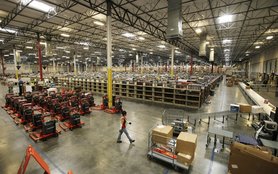The combined wealth of the world’s richest 1 percent will overtake that of everyone else by next year given the current trend of rising inequality, warned relief and development organization Oxfam America today ahead of the annual World Economic Forum meeting in Davos.
In a new issue brief published today, Wealth: Having it all and wanting more, Oxfam outlines how the richest 1 percent of the world have seen their share of global wealth increase from 44 percent in 2009 to 48 percent in 2014, and will likely surpass 50 percent in 2016. Oxfam’s executive director Winnie Byanyima, one of the co-chairs of the events in Davos, warned that the explosion in inequality is holding back the fight against global poverty at a time when 1 in 9 people do not have enough to eat and more than a billion people still live on less than $1.25-a-day.
“Do we really want to live in a world where the one percent own more than the rest of us combined? The scale of global inequality is quite simply staggering and despite the issues shooting up the global agenda, the gap between the richest and the rest is widening fast,” said Byanyima. “In the past 12 months, we have seen world leaders from President Obama to Christine Lagarde talk more about tackling extreme inequality but we are still waiting for many of them to walk the walk. It is time our leaders took on the powerful vested interests that stand in the way of a fairer and more prosperous world.”
In Davos, Byanyima will be calling for urgent action to stem this rising tide of inequality, starting with a crackdown on tax dodging by corporations, and to push for progress towards a global deal on climate change.
“Business as usual for the elite isn’t a cost free option – failure to tackle inequality will set the fight against poverty back decades,” said Byanyima. “The poor are hurt twice by rising inequality – they get a smaller share of the economic pie and because extreme inequality hurts growth, there is less pie to be shared around.”
Oxfam made headlines at Davos last year with the revelation that the 85 richest people on the planet have the same wealth as the poorest 50 percent (3.5 billion people). That figure has shrunk to 80 – a dramatic fall from 388 people in 2010. The wealth of the richest 80 doubled in cash terms between 2009-2014.
In Oxfam’s issue brief, the organization also outlines how 20 percent of billionaires around the world have interests in the financial and insurance sectors, a group that saw their cash wealth increase by 11 percent in the last 12 months. These sectors spent $550 million lobbying policy makers in Washington and Brussels alone during 2013. Billionaires listed as having interests in the pharmaceutical and healthcare sectors saw their collective net worth increase by 47 percent, and the industry spent more than $500 million lobbying policy makers in Washington and Brussels. Oxfam is concerned that the lobbying power of these sectors is a major barrier in the way of reforming the global tax system and of ensuring intellectual property rules do not deny access to lifesaving medicines for the world’s poorest.
In order to curb extreme inequality, Oxfam is calling on government to clamp down on tax dodging by corporations and rich individuals, invest in universal, free public services such as health and education, share the tax burden fairly by shifting taxation from labor and consumption towards capital and wealth, introducing and increasing minimum wages, introduce equal pay legislation and economic policies to give women a fair deal, and ensure adequate safety-nets for the poorest.
/ENDS
Notes: The projection of 1 percent wealth for 2016 was calculated by Oxfam using data on the wealth of 1%, 50%, 80% and 99% from the Credit Suisse Global Wealth Datebook (2013 and 2014). The wealth of the richest 80 was calculated using Forbes’ billionaires list. Credit Suisse made changes to its methodology between 2013 and 2014. Using this new methodology, last year’s ‘85’ would have been ‘90’. That means that the number of billionaires who have the same wealth as the poorest 3.5 billion has fallen from 90 to 80 in the last 12 months.


